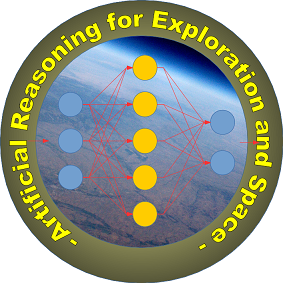|
|
|
|
|
|
The Artificial Reasoning for Exploration and Space (ARES) program is a framework for
developing and operating intelligent networks of autonomous platforms such as spacecraft, robots, and fixed
observation nodes.
ARES includes inter-platform messaging and multi-process operations.
ARES also include support for simple machine learning,
image processing, rule-based processing, and other computing methods in understanding the environment of
such intelligent networks.
ARES software is designed to run on a range of processors from large desktop or servers to small
processors. In particular, ARES is designed to run on platforms and in environments with:
- Limited, low-bandwidth, intermittent communications
- Limited platform resources such as power
- Limited supervision, i.e. autonomy
The ARSES framework was developed specifically to support university student teams in the development of networks of remote
platforms such as observation networks and CubeSats.
It is targeted at student teams made up primarily of Mechanical engineers with limited Computer Science support.
|

|
ARES Experimentation and Observation Network (AEON)
|
|
|
The ARES Experimentation and Observation Network (AEON) is a network of ARES-based autonomous agents
designed to explore, develop, and test various methods of autonomous spacecraft,
spacecraft constellations, and networks of spacecraft cooperating with ground resources.
AEON will be developed through a set of autonomous/machine learning experiments designed to progress
knowledge about networked-autonomous agents.
These experiments will be testing on a range of remote platforms from single simple CubeSats to
networks of CubeSats and remote ground observation platforms.
The long-term goal of AEON is the development of autonomous spacecraft,
spacecraft constellations, and networks of spacecraft cooperating with ground resources.
Each spacecraft (and ground node) are autonomous agents, making their own decisions but in a cooperative network.
In particular, within constellation/networks with limited communications capabilities.
In effect, the use of "cooperative space agents in low-bandwidth, high-latency environments".
BRT has teamed with Saint Louis University's Space Systems Research Lab to fly
AEON experiments on a series of CubeSats and CubeSat networks to test and evaluate various space autonomous agent technologies.
|

|
|
|
|
Bennett Research Technologies is serving as a sponsor of for
Saint Louis University's DARLA CubeSat currently under development
(Launch Scheduled via NASA's ELaNA program for Fall 2024).
Support includes:
- Provider and support of the ARES Framework
- Provider of the payload (AEON with a set of specific single-platform Machine Learning/Autonomy Experiments)
- Student Mentoring and Support
|
|
|
|
Bennett Research Technologies is serving as a sponsor of for
Saint Louis University's DARLA-2 CubeSat currently under development
(Launch Scheduled via NASA's ELaNA program for no earlier than fall 2025).
DARLA-2 is an upgrade of the DARLA CubeSat including greater processing power and
extended electric power via deployable solar panels.
Support includes:
- Provider and support of the ARES Framework
- Provider of the payload (AEON with a set of specific single-platform Machine Learning/Autonomy Experiments
desgined to take advantage of the greater processing processing power and operational time.
- Student Mentoring and Support
|
Distributed Observation, Reasoning, and Reaction Experiment (DORRE) Cubesat Constellation
|
|
|
Bennett Research Technologies is teamed with Saint Louis University's
Space Systems Research Lab on the Air Force's Nanosat
(NS-10 and NS-11) program's
Distributed Observation, Reasoning, and Reaction Experiment (DORRE).
|
Alice (ARES Learn Spacecraft Autonomy Experiment)
|
|
|
An experimental CubeSat mission designed to explore reinforcement learning in close-proximity
spacecraft operations.
Technologies developed will be tested on Saint Louis University's
Space Systems Research Lab on the Air Force's Nanosat
(NS-12) program's
Sardonyx Close-Proximity Operations CubeSat.
|
Sardonyx
|
|
|
Bennett Research Technologies is teamed with Saint Louis University's
Space Systems Research Lab on the Air Force's Nanosat
(NS-12) program's
Sardonyx Close-Proximity Operations CubeSat.
Bennett Research Technolgies provides mission design, systems engineering, and student mentoring support
as well as the ARES flight software framework and software development support.
In addition, Bennett Research Technologies will fly the Alice Close-Proximity control system as one of
two flight experiments.
|
|

